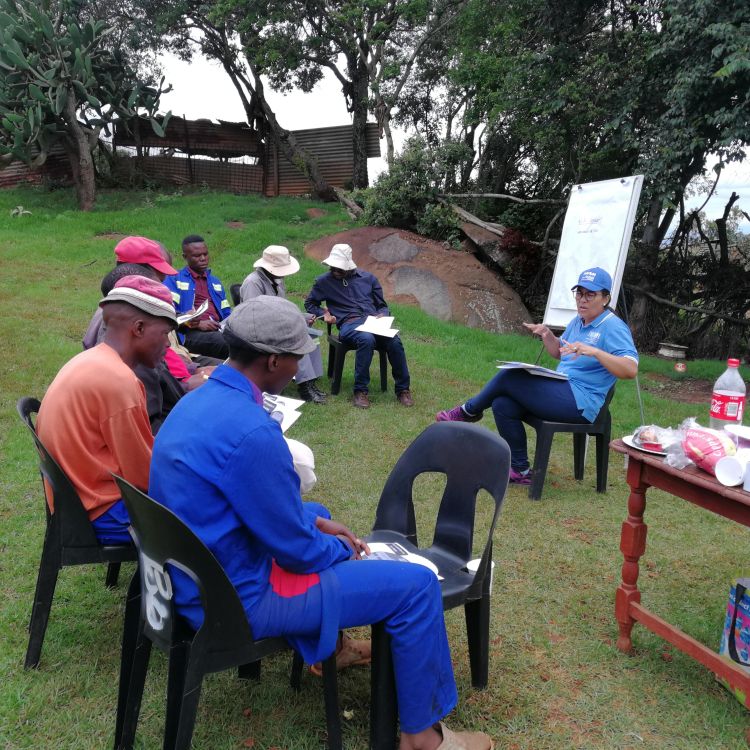OUTCOME STORY
Hybrid water law
for historical justice
in South Africa
90% of small users use 10% of the water, while 10% of large users use 90% of the water.
Though apartheid in South Africa officially ended in 1994, vestiges still remain. Despite some post-apartheid water laws, the distribution of water resources remains highly unequal. IWMI is working with partners to identify options that can help decolonize statutory water law through a hybrid approach, finally helping those 90% of small users to get their equitable water share.
Injustices due to the existence of dual, race-based legal systems were painfully visible during apartheid. A tiny minority grabbed the best land and water resources. In 1994, the new democratic state made discrimination illegal, while South Africa’s government proposed new water policies and laws to achieve racial and gender justice.
The National Water Act (NWA) of 1998 strived for a progressive, distributive approach to water but its interpretation and implementation have actually created greater inequalities. Under the NWA, water uses that were lawful under earlier legal regimes could remain as ‘Existing Lawful Uses’ (ELUs), a clause that powerful white users administratively exploited by hoarding such entitlements. After 1998, anyone wanting new access to water needed to obtain a permit.
The second-class collective ELUs in former homelands have not been elevated yet. Because the needs of small-scale users have not yet been recognized as ELUs, they still have to apply for a permit to legally gain access to water resources. For post-1998 users, the process of getting permits is often costly, lengthy and bureaucratic for small-scale users. These users are then criminalized without a permit. Micro-scale water users are exempted from the obligation to apply for a permit but are then marginalized because exempted uses have a weaker legal standing than permitted water uses.
The most common point of contention in South Africa regards the monetary value of water entitlements. High-impact users have used ELUs, gained through racist laws, to claim high monetary values when transferring entitlements to this public resource to other users (as water trade) or through surrendering to the government (for compensation).
Moving toward hybrid water law
 Now there is a path to ensuring historical justice in South Africa. For countless generations, living customary water rights regimes have governed water rights for millions of small-scale and micro-scale users in Africa’s informal rural economies.
Now there is a path to ensuring historical justice in South Africa. For countless generations, living customary water rights regimes have governed water rights for millions of small-scale and micro-scale users in Africa’s informal rural economies.
IWMI is working with South African partners to encourage the use of ‘hybrid water law’, which is a suite of legal tools that are fit-for-purpose in different contexts across the African continent. Hybrid water law aligns legal tools from statutory law with customary legal systems. It combines state-managed and customarily managed water regulation.
This hybrid approach recognizes that permitting is a useful tool for regulation of high-impact users. However, for all other users, different legal tools are needed. The approach is administratively lean, recognizes customary law and protects the most vulnerable. Instead of being entangled in concerns of getting a permit or not, hybrid law focuses on determining the ultimate goals that communities and states want to achieve through the regulation of precious water resources, and how best these can be realized.
Implementing hybrid law in Inkomati-Usuthu
IWMI is trialing an alternative hybrid approach to achieving historical justice in the Inkomati-Usuthu Water Management Area (IWMA) in the north-eastern part of South Africa. Like elsewhere in South Africa, powerful users deprive the most vulnerable of water even for basic livelihoods, with just 7% of all those registered using a vast 83% of all registered volumes.
IWMI is collaborating with the Water Research Commission (WRC) and the water authorities concerned – the Department of Water and Sanitation at national level and the decentralized Inkomati-Usuthu Catchment Management Agency (IUCMA) – to develop an implementation plan for the Inkomati Catchment.
The project team is piloting different tools for legal recognition, protection and prioritization of collectively-held water resources in former homelands vis-à-vis upstream and downstream users. The team is also exploring a reserve for core minimum volumes to meet constitutional rights to water and food, and administrative justice in permitting. As part of the effective curtailment of high-impact users, WRC, IWMI and IUCMA are also assessing realistic crop water requirements, so that water allocations are based on factual use instead of total land areas, whether cultivated or not.
With these changes ongoing, finally one of apartheid’s major injustices can be redressed enabling a fairer rights regime for smallholder farmers in South Africa.
